| Srl | Item |
| 1 |
ID:
025231


|
|
|
|
|
| Publication |
New Jersey, Prentice Hall,Inc, 1964.
|
| Description |
vi, 182p.pbk
|
|
|
|
|
|
|
|
|
|
|
|
Copies: C:1/I:0,R:0,Q:0
Circulation
| Accession# | Call# | Current Location | Status | Policy | Location |
| 021358 | 954.93/ARA 021358 | Main | On Shelf | General | |
|
|
|
|
| 2 |
ID:
091362
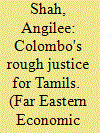

|
|
|
| 3 |
ID:
130718


|
|
|
|
|
| Publication |
2014.
|
| Summary/Abstract |
Elections for the Northern Provincial Council (NPC) of Sri Lanka were held on September 21, 25 years after they were first held in 1988 under the Thirteenth Amendment (13A) to the Sri Lankan Constitution, which formed part of the Indo-Lanka Accord. It was, however, the first election since the demerger of the Northern and Eastern Provinces in 2006.1 With the end of 30 years of war that had culminated in the elimination of the Liberation Tigers of Tamil Eelam (LTTE), election to the NPC was politically crucial for the Tamils, especially in the post-war context. Moreover, the devolution debate has become increasingly politicised in Sri Lanka, where the victory of the government, i.e. of the Sinhala majority, through war is projected as the end of the conflict and has been equated to the end of terrorism. The defeat of the LTTE has brought an end to terrorism and their espousal of separatism. Many ultra-nationalists represented by Jathika Hela Urumaya (JHU), Janatha Vimuki Perumuna (JVP) and so on even argue that demand for autonomy is no longer an agenda for the majority. It has come to imply that the Tamils must accept the position of secondary citizens. In short, what they lost through war cannot be gained through negotiation and nothing should be conceded.
|
|
|
|
|
|
|
|
|
|
|
|
|
|
|
|
| 4 |
ID:
116079
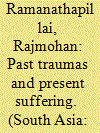

|
|
|
|
|
| Publication |
2012.
|
| Summary/Abstract |
This paper examines the real and expanded stories of Buddhist trauma in Sri Lanka and how they impair Sinhalese attempts to make a peace settlement with the Tamil minority. Drawing on the crisis that resulted from the installation of a Buddha statue in Trincomalee in 2005, the paper investigates the Buddhist trauma narratives in the stories of Emperor Asoka of India and King Dutthagamini of Sri Lanka to study the impact of such narratives on contemporary conflict. The paper concludes that long-lasting peace in Sri Lanka cannot be achieved simply through political solutions; efforts at peace must also find healing ways of telling Buddhist narratives of collective trauma and reintroducing narratives of history and identity in the light of hope.
|
|
|
|
|
|
|
|
|
|
|
|
|
|
|
|
| 5 |
ID:
126914
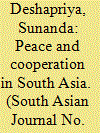

|
|
|
| 6 |
ID:
094464


|
|
|
| 7 |
ID:
091841


|
|
|
|
|
| Publication |
2009.
|
| Summary/Abstract |
The Sri Lanka's security forces remarkable success in inflicting a crushing defeat on the Tamil separatist insurgents of the Liberation Tigers of Tamil Eelam (LTTE) in the Eelam War IV in May 2009 has wide implications not only for the struggle of minority Tamil population for autonomy but also in the context of India-Sri Lanka relations.
|
|
|
|
|
|
|
|
|
|
|
|
|
|
|
|
| 8 |
ID:
089651
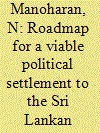

|
|
|
|
|
| Publication |
2009.
|
| Summary/Abstract |
Since the LTTE is no more, which actor should be in a position to negotiate with the Sri Lankan government on behalf of Tamils? The LTTE did not allow or accommodate different political view points. It focussed all its energies on military strategy, but forgot to foment a political strategy
|
|
|
|
|
|
|
|
|
|
|
|
|
|
|
|
| 9 |
ID:
117809


|
|
|
| 10 |
ID:
117817
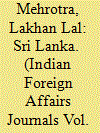

|
|
|
| 11 |
ID:
121000
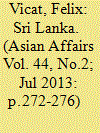

|
|
|
|
|
| Publication |
2013.
|
| Summary/Abstract |
Two separate trips to Sri Lanka provided the material for this brief examination of the reasons for the unexpectedly swift final defeat of the Tamil Tigers, whose ruthless methods had enabled them to resist for so long. But external fundraising was so successful that over time the priorities of the external contributors came to weigh over those of the Tamils in the North on whom the Tigers relied for their support and recruitment. The state they set up to sustain their campaign was none-too gentle. After 9/11, external funding was dramatically curtailed and this, combined with Chinese support and a crisis of recruitment set the stage for the final assault by the Sri Lankan army.
|
|
|
|
|
|
|
|
|
|
|
|
|
|
|
|
| 12 |
ID:
103635
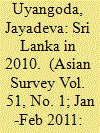

|
|
|
|
|
| Publication |
2011.
|
| Summary/Abstract |
The two key events of 2010 in Sri Lanka were the respective presidential and parliamentary elections, which enabled President Mahinda Rajapaksha's government to consolidate power in both the executive and legislative branches of the state in the post-civil war era. Regime priority has been toward political consolidation, rather than ethnic reconciliation and a political solution to potential ethnic tensions in the country.
|
|
|
|
|
|
|
|
|
|
|
|
|
|
|
|
| 13 |
ID:
122001
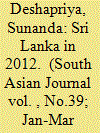

|
|
|
| 14 |
ID:
185176
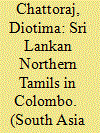

|
|
|
|
|
| Summary/Abstract |
The Sri Lankan conflict that officially ended in 2009 resulted not only in large numbers of Tamils leaving the country to join the vast global Tamil diaspora but also created many internally displaced persons (IDPs) from Sri Lanka’s Northern Tamil communities who settled in Colombo. This article examines the idea of home among such IDPs, showing how broken memories of an earlier home and different approaches towards return shape feelings of being an ‘insider’ or ‘outsider’ among Tamil IDPs in Colombo. Drawing on the life experiences of such IDPs, the article shows that they now often view Colombo as a more suitable home yet are still ‘becoming insiders’ rather than ‘being insiders’.
|
|
|
|
|
|
|
|
|
|
|
|
|
|
|
|
| 15 |
ID:
183858
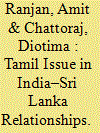

|
|
|
|
|
| Summary/Abstract |
More than 25 years of ethnic war in Sri Lanka ended in 2009. Expressing ‘serious concerns’ on human rights situation in post-civil war Sri Lanka, the United Nations Human Rights Council (UNHRC) has adopted critical resolutions. The eighth such resolution was adopted in March 2021. India abstained for the second time from voting on a resolution against Sri Lanka at the UNHRC since 2014. In 2012 and 2013, India voted in favour of resolutions that have been critical of Sri Lanka. This article, examines the shift in India’s approach towards the Tamil issue in Sri Lanka.
|
|
|
|
|
|
|
|
|
|
|
|
|
|
|
|
| 16 |
ID:
117927
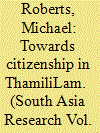

|
|
|
|
|
| Publication |
2013.
|
| Summary/Abstract |
In establishing the de facto state of Thamililam from 1990 onwards, the LTTE eliminated most of its Tamil rivals and mobilised the Tamil people for war in demanding ways. Despite its fascist character the Tiger state received the support of its subjects because it was understood to be a bulwark against Sinhala domination and the repository of sturdy Tamil nationalism, while the LTTE's propaganda cultivated a devotional aura around its mavirar (heroic dead).
This article highlights the strength of Tamil nationalism by interweaving this dimension within empirical details that outline Tamil political shifts and processes of migration from the 1970s to the 2000s. The centre of gravity in Tamil politics shifted first in the 1970s from a Colombo-Jaffna axis to a Jaffna-centric one and then from the Jaffna Peninsula to the Kilinochchi-Mullaitivu locality in 1995-96. The second spatial shift underpins the argument that the people under the LTTE were citizens of Thamililam. In technical terms they were dual citizens because they were also citizens of Sri Lanka. Where the latter claim was pressed-as it was, from different perspectives, by both the government of Sri Lanka and human rights advocates-one encountered a hegemonic imposition that denied the subjective feelings of those living within the de facto LTTE state. They were citizens of Thamililam. As such, they were enemies of Sri Lanka.
|
|
|
|
|
|
|
|
|
|
|
|
|
|
|
|
| 17 |
ID:
120216


|
|
|
|
|
| Publication |
2013.
|
| Summary/Abstract |
This article examines how the politics of scale affect a process of dialogue led by civil society actors over fishing conflicts taking place at the local level in South Asia. The location is the Palk Bay and the fishers are Tamils from India and Sri Lanka. An agreement over fishing rights reached between these fishers in August 2010 remains largely unimplemented, but takes centre stage for this article, which examines the negotiation processes in terms of politics of scale and highlights the various difficulties encountered. Major pitfalls in a dialogue of this sort are the failure to recognise diversity within the population(s) involved and lack of recognition of the linkages of this population with other actors at different scales or levels. In a transboundary context, national and regional identities at times override local identity and interests, thereby making locally constructed solutions difficult, if not impossible, to implement.
|
|
|
|
|
|
|
|
|
|
|
|
|
|
|
|